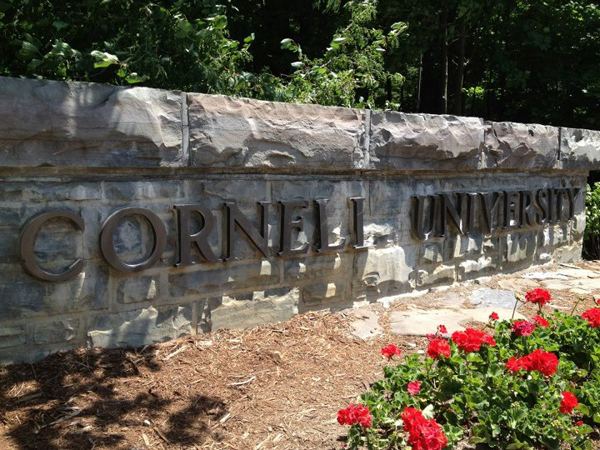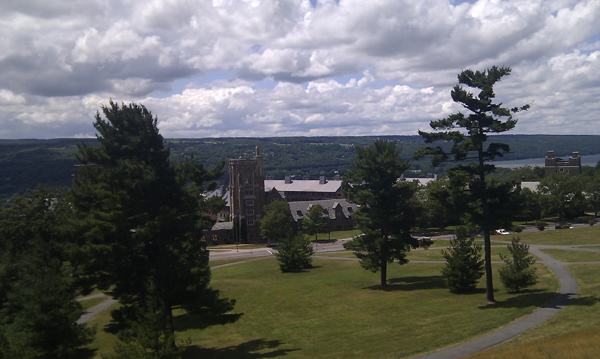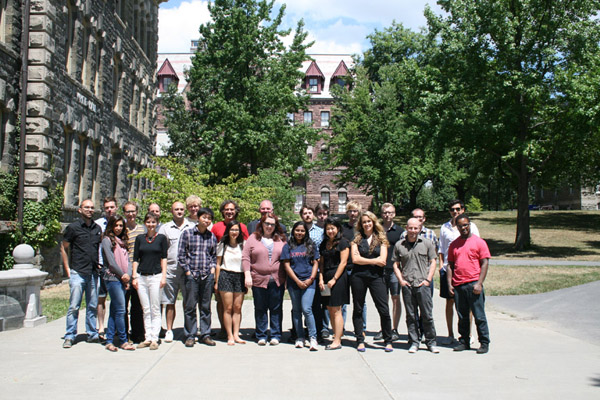The School of Criticism and Theory at Cornell University
By Nick Webber
The School of Criticism and Theory (SCT) began in 1976 at the University of California, Irvine, before moving on to Northwestern and Dartmouth, and finally arriving at Cornell University in 1997, where it has since stayed. Its ethos is one of free intellectual debate (beyond the confines and politics of home institutions), and its focus is that of cutting-edge trends and theories within the humanities.
Nick Webber is a PhD student in the School of English

My only previous visit to the States was as a wide-eyed 10-year-old boy overjoyed at the prospect of spending a fortnight in the rich plasticity and ersatz bonhomie of Mickey Mouse’s Florida. Or that was how it was sold, anyway. In reality my parents had decided (against my better wishes) that we wouldn’t actually visit the dark seat of the Disney Empire, and would instead enjoy other sites of “cultural” interest like the Kennedy Space Centre and the Everglades. It was then, and remains today, the most bitter of betrayals, so it was somewhat fitting that as I embarked on my second trip to America—for a 6-week stint at the School of Criticism and Theory (SCT) at Cornell University—I should pass on my way to the airport the Hong Kong Disneyland train, its Mickey-shaped windows providing something of a Proustian rush of that long-forgotten memory.
Over the intervening years, though, things have changed, so that as Pluto became Plato, Ariel became Aristotle, and Mickey Mouse became Marcel Mauss, it was not so much with childlike excitement that I turned to my impending trip Stateside, but more with a growing and very real apprehension (borne of that Socratic truism that the more you know the more you realise how little you know) that I wouldn’t be up to scratch, that I would be outgunned academically. Neither the title of my 6-week seminar, “Philosophy of the Passions, Rhetorics of Affect,” nor the colossal reading list associated with it—containing the likes of Heidegger, de Man, Rousseau, Hobbes, and Sloterdijk—did much to allay these fears. But off I journeyed anyhow.

After a short stay in the hustle of New York City—spent largely trying not to get lost—I travelled by Greyhound Bus through the forests, trailer-parks and strip-malls of upstate and, after five or so hours, arrived at my final destination of Ithaca. The town itself is pretty small, with a population made up predominantly of out-of-time hippies sporting lurid tie-dye T-shirts, but for all its shortcomings, it sits in some of the most beautiful countryside I’ve ever seen, with lakes, gorges, waterfalls and national parks as commonplace as, say, spitting pedestrians are here in Hong Kong. Cornell University sits, vast, on a bluff above the town, overlooking all this natural splendour; it would be hard to imagine, in fact, a more perfect location for study and quiet reflection. Even commuting by death-trap bicycle to and from the (perpendicular) campus was a joy, with deer, squirrels, chipmunks and the occasional groundhog scurrying about the place living their lives.
And this was a commute I was to become very familiar with, in fact, what with the SCT’s jampacked schedule of seminars, lectures, colloquia and social events, all of which, social occasions excepted, of course, came with hefty reading requirements—reading requirement which were, in turn, made increasingly gruelling by the “legacy” of the social occasions themselves. Every week there would be eminent visiting professors giving lectures and mini-seminars on their
current research (ranging from analytical philosophy and trauma studies to lyric theory and postcolonialism); there would be group-wide discussions of circulated essays and articles; there would be public lectures given on a whole range of topics; and then there would be the 6-week seminars themselves, in which selected ideas and authors were rigorously and intensively studied and discussed under the guidance of our seminar leader, Professor John Brenkman. Add to this the likes of post-lecture receptions, hiking expeditions, picnics by the lake, wine-tasting tours, parties, bike-rides, kayaking, barbecues and swimming, and it becomes clear that little time was left to sit back and relax.

Over the course of the 6 weeks, though, by far the most intellectually nourishing and enjoyable aspect of the program was the intense debate and discussion with fellow participants. People come to the SCT from all over the world and they bring with them both their own area of expertise and an ardent interest to learn more about what other research postgraduates are up to across the globe. I met some remarkable people doing fascinating work, and have made connections and friendships which will last well into the future. I have spoken with many fellow participants since we left the program, in fact, and all of us already miss the unique social and intellectual “bubble” that was the SCT— although we all also agree that it is probably best for both mind and body that the 6 weeks eventually came to an end, so that we could return to the normality of our daily studies, renewed and reinvigorated (rather than bent and broken) by the intensity of our shared experiences at Cornell.
Returning to Hong Kong, then, was, much like an Ithacan tie-dye T-shirt, an experience of many colours and shades: sad, in that I was leaving behind new friends and acquaintances; exciting, in that I was returning to Hong Kong full to the brim with new ideas and directions for my research; and also joyful, in that it was a richly rewarding and edifying adventure which will never be forgotten.
And this time, Mickey Mouse, for all the right reasons …

Our apologies, you must be logged in to post a comment.